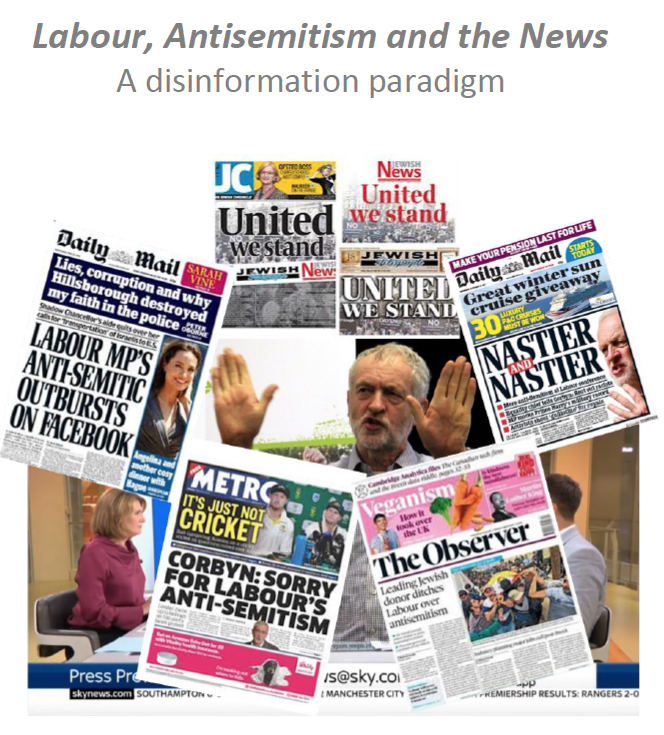The Media Reform Coalition has conducted in-depth research on the controversy surrounding antisemitism in the Labour Party, focusing on media coverage of the crisis during the summer of 2018. Following extensive case study research, we identified myriad inaccuracies and distortions in online and television news including marked skews in sourcing, omission of essential context or right of reply, misquotation, and false assertions made either by journalists themselves or sources whose contentious claims were neither challenged nor countered. Overall, our findings were consistent with a disinformation paradigm.
We use the concept of disinformation to denote systematic reporting failures that broadly privileged a particular political agenda and ideological narrative. This does not mean that these failures were intentional or that journalists and news institutions were inherently biased. We recognize, for instance, that resource pressures combined with acute and complex controversies can foster particular source dependencies or blind spots.
Nor does our research speak in any way to allegations of smear tactics. To interrogate the root causes of disinformation would necessitate a far more wide-ranging study than was undertaken here. We start from the well-founded assumption that concerns about antisemitic hate speech within the Labour Party are genuine and not necessarily or entirely misplaced. There have been unambiguous examples of racist discourse invoking holocaust denial, generalized references to Jews in stereotyped contexts, and critiques of Zionists or Zionism that explicitly use the terms as proxies for Jews. Some of these cases have involved holders of official positions within the party, including local councilors.
Alongside such cases, there is a contested category of discourse that may be considered offensive or insensitive but not necessarily racist. Indeed, determining what counts as antisemitism lies at the heart of the wider controversy that has been played out in reams of column inches and air time since 2015, and with particular intensity during the spring and summer of 2018. We reserve judgement on this central point of contention but acknowledge legitimate views on both sides, as well as a spectrum in which relatively extreme and moderate positions are easily identifiable.
We recognize that this controversy – on the surface at least – involves prominent voices in a minority community accusing a major political party of harbouring racism directed towards them. What’s more, these voices have been vocally supported by many high profile Labour MPs. In such circumstances we expect journalists to take these concerns seriously, view them as inherently newsworthy, and not necessarily afford equal time and attention to contesting views. It is also important to stress that journalists must be allowed – on occasion – to get the story wrong: the public interest is never served by an overly cautious press.
But we do expect professional journalists to strive for accuracy, to establish essential contextual facts in any given story, and to actively seek out dissenting or contesting opinion including, in this case, within the minority group in question, within other affected minorities, and amongst relevant experts (both legal and academic). Nor do the particular complexities and sensitivities absolve journalists of their responsibility to offer a due right of reply to the accused or to interrogate contentious claims made by sources on all sides.
Overall, we found 95 clear cut examples of misleading or inaccurate reporting on mainstream television and online news platforms, with a quarter of the total sample containing at least one such example. The problem was especially pronounced on television – which reaches far wider audiences by comparison – where two thirds of the news segments on television contained at least one reporting error or substantive distortion.
Underlying these figures was a persistent subversion of conventional news values:
- Several reports focused on a controversial social media post by Jeremy Corbyn omitted any mention that it was made six years ago, with some emphasising a sense of currency and recency that failed to make clear the historical context of the post.
- Journalists covering the launch of Labour’s antisemitism report in 2016 routinely misquoted an activist in ways that were entirely removed from his original comment, in spite of a video recording of the event that was readily and immediately accessible.
- Above all, coverage of Labour’s revised code of conduct during the summer of 2018 often entirely omitted critical discussion of the ‘working definition’ of antisemitism put forward by the International Holocaust Remembrance Alliance (IHRA), and wrongly characterized it as consensual and universally adopted.
- Although the IHRA is an international body with representatives from 31 countries, only six of those countries have, to date, formally adopted the definition themselves.
- In spite of a call for local authorities to adopt the definition by the UK’s central government in early 2017, Less than a third of councils have responded and several of those have chosen not to include any of the controversial examples contained within the working definition.
- Several high-profile bodies have rejected or distanced themselves from the working definition, including the EU’s Fundamental Rights Agency (a successor to the body that drafted the original wording on which the definition is based) and academic institutions including the London School of Economics and School of Oriental and African Studies.
- Mainstream academic and legal opinion has been overwhelmingly critical of the IHRA definition, including formal opinions produced by four leading UK barristers.



